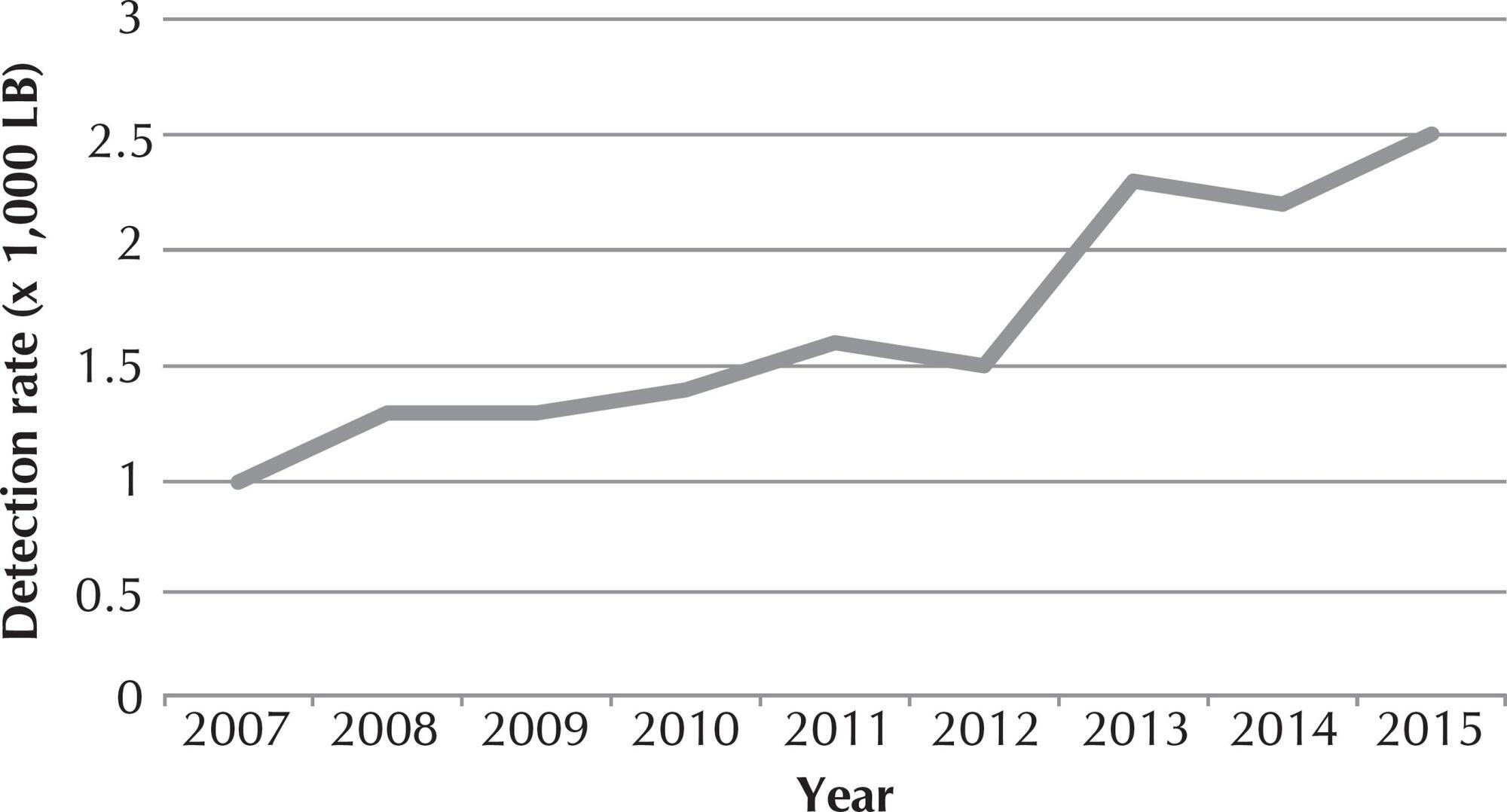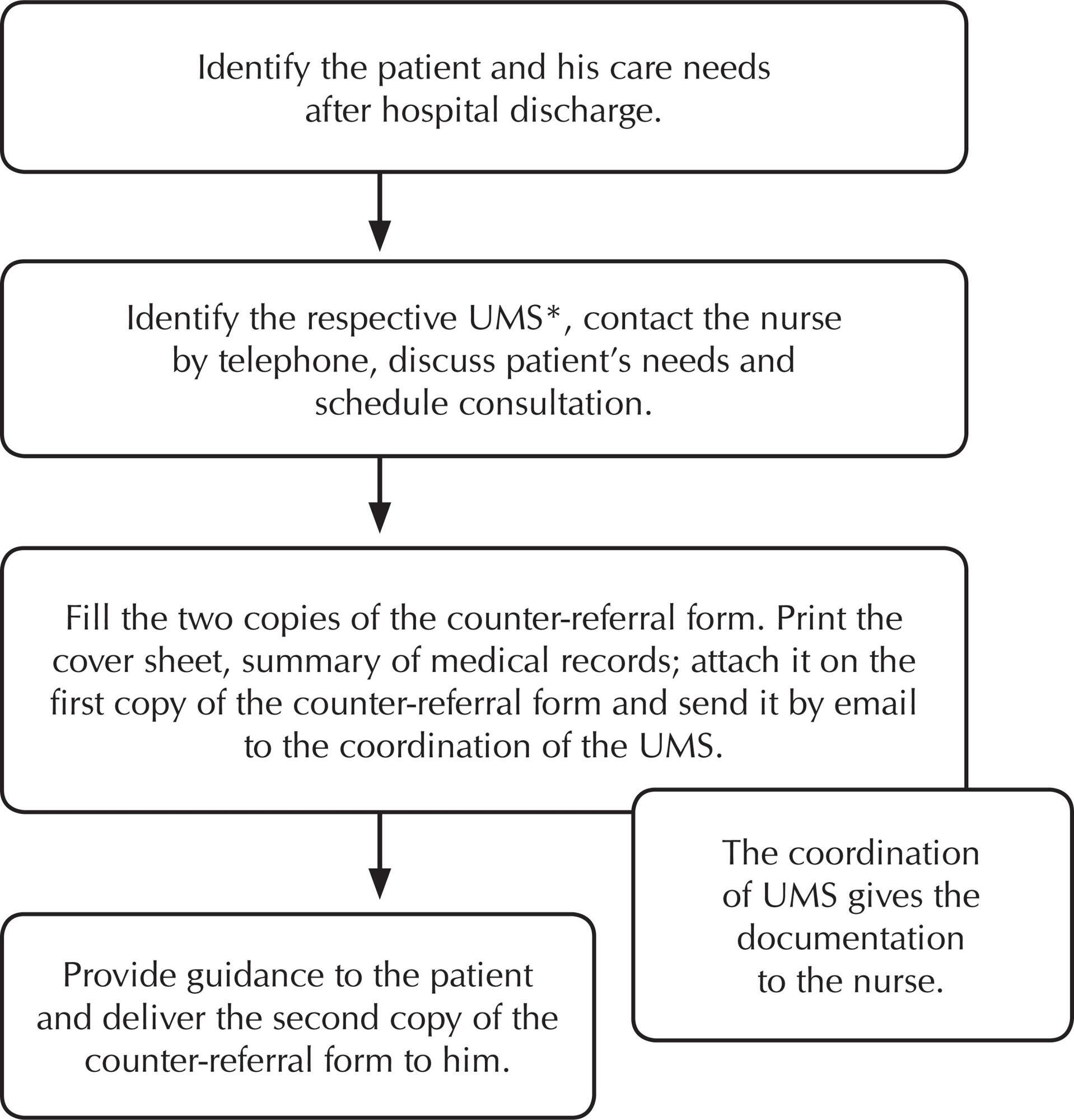-
RESEARCH01-01-2018
Adhesion to patient safety protocols in emergency care units
Revista Brasileira de Enfermagem. 2018;71:577-584
Abstract
RESEARCHAdhesion to patient safety protocols in emergency care units
Revista Brasileira de Enfermagem. 2018;71:577-584
DOI 10.1590/0034-7167-2017-0504
Views0See moreABSTRACT
Objective:
To investigate compliance of national patient safety protocols in Emergency Care Units (UPA) of the Paraná State.
Method:
From April until September 2016, the exploratory stage of the action research was conducted on stratified sampling with 377 patients of eight units, with use of verification instrument of basic safety actions.
Results:
The absence of systematic identification of patients, fall risk assessment and signaling and development of pressure injuries were evidenced. We observed that 52.8% of parenteral solutions in use were not identified and that, in only 29.4% of the cases, the allergic condition was investigated. In 80.6% of the emergency units there was availability of alcoholic solution to hand hygiene.
Conclusion:
We concluded that the non-compliance of basic actions concerning patient safety exposes users to preventable adverse events and demands systematized actions to comply with government guidelines and promote quality of health assistance.
-
RESEARCH01-01-2018
Epidemiological overview of HIV/AIDS in pregnant women from a state of northeastern Brazil
Revista Brasileira de Enfermagem. 2018;71:568-576
Abstract
RESEARCHEpidemiological overview of HIV/AIDS in pregnant women from a state of northeastern Brazil
Revista Brasileira de Enfermagem. 2018;71:568-576
DOI 10.1590/0034-7167-2017-0495
Views0See moreABSTRACT
Objective:
To learn the epidemiological characteristics of HIV infection in pregnant women.
Method:
Descriptive study with quantitative approach. The study population was composed of pregnant women with HIV/AIDS residing in the state of Alagoas. Data were organized into variables and analyzed according to the measures of dispersion parameter relevant to the arithmetic mean and standard deviation (X ± S).
Results:
Between 2007 and 2015, 773 cases of HIV/AIDS were recorded in pregnant women in Alagoas. The studied variables identified that most of these pregnant women were young, had low levels of education and faced socioeconomic vulnerability.
Conclusion:
It is necessary to include actions aimed at increasing the attention paid to women, once the assurance of full care and early diagnosis of HIV are important strategies to promote adequate treatment adherence and reduce the vertical transmission.

-
RESEARCH01-01-2018
Hand hygiene management among nurses: collective health challenges
Revista Brasileira de Enfermagem. 2018;71:562-567
Abstract
RESEARCHHand hygiene management among nurses: collective health challenges
Revista Brasileira de Enfermagem. 2018;71:562-567
DOI 10.1590/0034-7167-2017-0538
Views0See moreABSTRACT
Objective:
To describe the determining factors in hand hygiene management among nurses and identify associated collective health challenges.
Method:
Cross-sectional descriptive study. Data were collected using a questionnaire that was applied in four internal medicine units of a hospital of reference in Portugal.
Results:
The sample was composed of 50 nurses aged 26 to 55 years (mean age of 34.88 years); 80% were women, 58% had a Bachelor’s degree, and had 5-30 years of nursing practice (X̄ =11.94;±5.92). The vast majority of nurses (90%) reported complying with the existing recommendations on hand hygiene in pre-established moments. However, none of the nurses were able to identify all the moments for hand hygiene using water and soap or alcohol-based handrub.
Conclusion:
This study shows that continuous training, adequate materials/structures in the units, and redesigned administration/supervision practices are determining factors to achieve higher levels of adherence to hand hygiene among nurses, as well as increased quality and safety in care delivery, which is a current collective health challenge.
-
RESEARCH01-01-2018
How do old men take care of their own health in Primary Care?
Revista Brasileira de Enfermagem. 2018;71:554-561
Abstract
RESEARCHHow do old men take care of their own health in Primary Care?
Revista Brasileira de Enfermagem. 2018;71:554-561
DOI 10.1590/0034-7167-2017-0131
Views0See moreABSTRACT
Objective:
To understand the care of elderly men with their own health.
Method:
A qualitative study with the participation of ten elderly men, through responses to the semi-structured interview guided by the “Tell me about your experiences of care with your health”, carried out in a basic health unit, during the period of October-December 2014. The speeches, after being transcribed were submitted to content analysis.
Results:
The ten interviewees were retired and had an average age of 67.3 years. From the analysis of the data, two categories have emerged: Elderly health care ways and health service as a supporter in the care (less) of the elderly, which revealed the restriction of health care to the triad: medicines, consultation to professionals and exams.
Final considerations:
Institutional and sociocultural barriers that need to be overcome so that the male population can be consolidated, guaranteeing care of their peculiarities, encouraging active behaviors for self-care.
-
RESEARCH01-01-2018
Nurse liaison: a strategy for counter-referral
Revista Brasileira de Enfermagem. 2018;71:546-553
Abstract
RESEARCHNurse liaison: a strategy for counter-referral
Revista Brasileira de Enfermagem. 2018;71:546-553
DOI 10.1590/0034-7167-2017-0490
Views0ABSTRACT
Objective:
to identify the profile of the counter-referred patients by the “nurse liaison” and to describe the experience of the professionals who participated in the project.
Method:
intervention research, with twelve nursing nurses from a hospital and an Emergency Care Unit, and 26 nurses from Primary Health Care. Data were obtained through questionnaires and counter-referral forms.
Results:
Out of 43 counter-referred individuals, 62.8% are over sixty years, 53.5% are men with multi-pathologies. Among the positive aspects, the nurses highlighted the dialogue between health care services, agility in the acquisition of inputs for the continuity of care in primary care, benefiting patients after hospital discharge. The greatest challenge was the lack of time and the deficit of nurses to perform the function.
Final considerations:
the presence of the “nurse liaison” has proved to be an important strategy to improve integration between services and to promote continuity of care.
Keywords:Continuity of Patient CareIntegrality in HealthNursingPatient DischargeProfessional PracticeSee more
-
RESEARCH01-01-2018
Depression in the wives of convicted men: prevalence and associated factors
Revista Brasileira de Enfermagem. 2018;71:538-545
Abstract
RESEARCHDepression in the wives of convicted men: prevalence and associated factors
Revista Brasileira de Enfermagem. 2018;71:538-545
DOI 10.1590/0034-7167-2017-0263
Views0See moreABSTRACT
Objective:
To estimate the prevalence of depression and to identify the main risk factors associated with depression in wives of convicted men.
Method:
Descriptive, cross – sectional, quantitative approach. The data were collected with 349 female partners of convicted patients in three penitentiaries in the state of Paraná, with a semistructured research, between January and June of 2016, being compiled in a database and analyzed using SPSS® 20.0 software.
Results:
It was possible to identify vulnerability to depression among wives of convicted men, most were young and 42.2% have or already had depression. It was verified that the variables to depression were ages equal to or above 30 years (50.3%, p <0.001), smoking (61.1%, p <0.013) and alcoholism (16.1%, p <0.001).
Conclusion:
It is the responsibility of the nurse with the multidisciplinary health team to invest in health promotion and prevention actions against these risk factors that were associated with depression in this population.
-
RESEARCH01-01-2018
Primary health care: the experience of nurses
Revista Brasileira de Enfermagem. 2018;71:531-537
Abstract
RESEARCHPrimary health care: the experience of nurses
Revista Brasileira de Enfermagem. 2018;71:531-537
DOI 10.1590/0034-7167-2016-0244
Views0ABSTRACT
Objective:
to understand the meaning of nursing care in primary health care from the perspective of Chilean nurses.
Method:
this was a qualitative study based on the social phenomenology of Alfred Schutz. Data was collected between January and April 2013, through interviews with 13 primary health care nurses in Chile.
Results:
the nurses perceived primary care as a gratifying experience, considering it an encounter of subjectivities. However, they felt burdened with multiple functions and by the hierarchical pressure to achieve targets. They strived to implement innovative care, expressed by the desire to go beyond traditional care practices, and improve the efficiency of management at the various levels of health care.
Conclusion:
it is important to discuss the results of the present study in the context of health care and especially nursing education, with the goal of better preparing nurses who will deliver care at the primary health care level.
Keywords:Family Nurse PractitionersNursing CarePractical NursingPrimary Health CareQualitative ResearchSee more -
RESEARCH01-01-2018
El cuidado en la Atención Primaria de Salud: vivencia de las enfermeras
Revista Brasileira de Enfermagem. 2018;71:531-537
Abstract
RESEARCHEl cuidado en la Atención Primaria de Salud: vivencia de las enfermeras
Revista Brasileira de Enfermagem. 2018;71:531-537
DOI 10.1590/0034-7167-2016-0244
Views0RESUMEN
Objetivo:
comprender el significado de realizar cuidados de enfermería en la Atención Primaria de Salud desde la perspectiva de las enfermeras chilenas.
Método:
investigación cualitativa con enfoque desde la fenomenología social de Alfred Schütz. La recolección de datos fue realizada entre enero y abril del 2013, a través de entrevista con 13 enfermeras de Atención Primaria en Chile.
Resultados:
las enfermeras perciben el cuidado como una experiencia gratificante considerando un encuentro de subjetividades. Sin embargo, se sienten sobrecargadas por múltiples funciones a realizar y por presiones jerárquicas en el logro de las metas. Aspiran implementar cuidados innovadores manifiestados por el deseo de superar el cuidado tradicional y la eficiencia de la gestión de los diversos niveles de atención de la salud.
Conclusión:
es importante discutir estos resultados en el contexto de la asistencia y especialmente en la formación, con el fin de preparar mejor a las enfermeras que brindarán cuidados en este nivel de atención.
Keywords:Atención de EnfermeríaAtención Primaria de SaludEnfermeras de FamiliaEnfermería PrácticaInvestigación CualitativaSee more
Search
Search in:
Nuvem de Tags
Aged (144) Atenção Primária à Saúde (239) COVID-19 (104) Cuidados de Enfermagem (269) Educação em Enfermagem (151) Educação em Saúde (139) Enfermagem (930) Estudos de Validação (131) Health Education (144) Idoso (208) Mental Health (149) Nursing (987) Nursing Care (306) Patient Safety (151) Primary Health Care (284) Qualidade de Vida (104) Quality of Life (106) Saúde Mental (145) Segurança do Paciente (150) Validation Studies (108)



